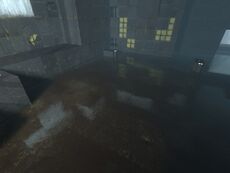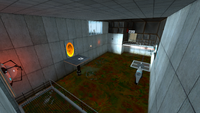Goo

| “ | The subtext of that acid pit is acid. The content of the pit is also acid. I'll let you fully absorb it.
— GLaDOS
|
” |
The Goo,[1] also known as Toxic Water, Acid, Hazard Liquid, Dirty Water and Deadly Goo, is a common environmental hazard in both Portal and Portal 2.
Overview
Goo is usually present within testing chambers in order to provide a penalty for failure, and to ensure that test subjects are precise with their movements and positioning of their portals.
Almost all objects that have fallen into the goo are irretrievable, with the only exception being radios because they are light enough to float on it. In such cases where testing elements like cubes are needed to solve a test, a replacement may be issued immediately if the first one was dropped into the goo (unless the dropper is activated by a button, in which case you may have to press the button again). On some occasions during Portal 2, objects in the goo can be heard and seen fizzling immediately after falling in, while in most, they will simply be deleted soon after they fall out of sight and are not being held on to.
Appearance-wise in Portal, the goo appears as a mixture of red, green, and brown-colored liquid with a swirled appearance. As of Portal 2, the goo appears to be mainly brown, often with smoke swirling around its presence like in Portal.
Any contact with the goo will result in continuous damage that will eventually result in killing Chell, P-body, Atlas, Bendy or whoever you are playing as within a few seconds upon contact.
Gallery
| Portal | |||||||||
| |||||||||
Closed Captions
Trivia
- Using cheats to fire a rocket into the goo results in an Isaac Kleiner voice line ("Oh, fiddlesticks. What now?") from Half Life 2 playing. This voice line is a fallback sound used by Valve to indicate a nonexistent or missing sound file.
References
